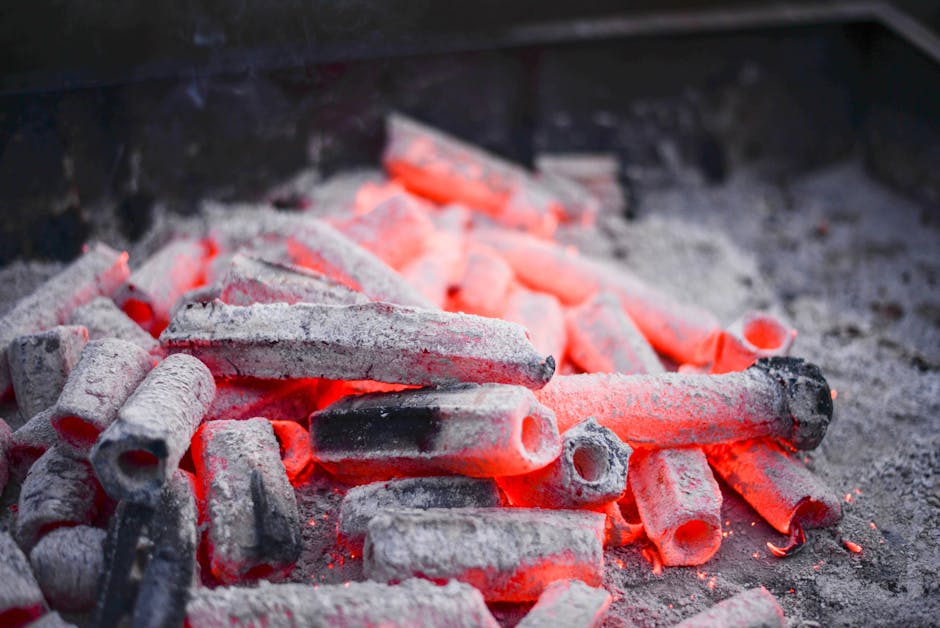Why Briquettes Are the Smart Heating Choice
Briquettes for heating are becoming a smart choice for many eco-conscious homeowners and businesses. If you’re looking for an efficient and environmentally friendly heating solution, briquettes are worth considering.
Quick Facts:
- Eco-Friendly: Made from recycled materials
- Efficient: High energy density with long burn time
- Cost-Effective: Competitive pricing compared to traditional options
Briquettes are compacted blocks usually made from biomass, which includes wood shavings, sawdust, and agricultural waste. Unlike traditional firewood, they burn longer and more evenly, offering consistent heat output. This makes them not just a green option but also an efficient one for those who need reliable heating, whether for homes or larger projects.
Think of briquettes as a win-win: saving you money while helping the planet. They’re easy to store and can fit into various heating systems, from stoves to industrial boilers.
For someone like Alex Green, a construction project manager in the USA, choosing briquettes means finding a supplier that delivers on quality and reliability. It’s a solution that aligns with his focus on meeting international standards and maintaining project timelines and budgets.

Quick briquettes for heating definitions:
What Are Briquettes?
Briquettes are compacted blocks made primarily from compressed material. They are a smart alternative to traditional firewood and are designed to provide consistent heat.
Understanding the Basics
Biomass briquettes are crafted from organic materials like wood shavings, sawdust, and agricultural waste. These materials are compressed under high pressure, forming dense blocks that burn efficiently. Imagine taking all those wood scraps and turning them into something that heats your home without the mess of traditional logs.

Coal briquettes are another type, made from a mix of coal dust and binding agents. They offer a different heating experience and are often used where high heat output is needed. However, they are less eco-friendly compared to biomass options.
The Science Behind Briquettes
The magic of briquettes lies in their compression. When materials like sawdust are pressed together, they form a dense block. This density is key—it means the briquette burns longer and hotter than loose materials.
- Energy Density: Briquettes have high energy density, meaning they store more energy than the same volume of loose biomass. This results in longer burn times.
- Moisture Content: Lower moisture content in briquettes compared to traditional firewood means they ignite faster and burn more efficiently.
Real-World Applications
For instance, in rural areas of the USA, people use briquettes for both home heating and cooking. They’re a versatile solution that fits into various heating systems, from traditional stoves to modern boilers.
Whether you’re in the USA, UK, EU, or Australia, understanding what briquettes are and how they work can help you make an informed choice for your heating needs.
Next, we’ll dive into the different types of briquettes for heating and how to choose the right one for you.
Types of Briquettes for Heating
When it comes to briquettes for heating, there are three main types to consider: wood briquettes, peat briquettes, and charcoal briquettes. Each has its own unique properties and benefits. Let’s break them down.
Wood Briquettes
Wood briquettes are made from compressed sawdust and wood shavings. They are a popular choice for several reasons:
- Eco-Friendly: Wood briquettes are often produced from recycled materials, making them a sustainable choice.
- High Heat Output: They burn hotter and longer than traditional logs, providing consistent warmth.
- Low Moisture Content: This means they light easily and burn efficiently, reducing the smoke and residue compared to regular firewood.
Wood briquettes are great for those who want an environmentally friendly and efficient heating option. They fit well in various heating systems, from stoves to fireplaces.
Peat Briquettes
Peat briquettes are made from compressed peat, a type of organic material found in bogs. Here’s what you should know:
- Long Burn Time: Peat briquettes are known for their long-lasting burn, making them ideal for overnight heating.
- Moderate Heat Output: While they don’t burn as hot as wood briquettes, they provide steady warmth.
- Unique Aroma: Burning peat gives off a distinctive, earthy smell that some people love.
Peat briquettes are a good choice if you’re looking for a slow, steady burn and enjoy the traditional aroma they offer.
Charcoal Briquettes
Charcoal briquettes are made from charcoal dust and a binding agent. They are commonly used in grilling but can also be used for heating:
- High Heat Output: Charcoal briquettes burn very hot, making them suitable for high-temperature needs.
- Consistent Performance: They burn evenly and consistently, providing reliable heat.
- Less Smoke: Compared to raw wood or peat, charcoal briquettes produce less smoke.
While not as eco-friendly as wood or peat options, charcoal briquettes are excellent for situations requiring intense heat.

Choosing the right type of briquette depends on your specific heating needs and environmental preferences. Whether you prioritize eco-friendliness, burn time, or heat output, there’s a briquette option that fits your needs.
Next, we’ll explore the benefits of using briquettes for heating and why they might be the perfect choice for your home.
Benefits of Using Briquettes for Heating
When considering briquettes for heating, there are three standout benefits: energy density, long burn time, and eco-friendliness. Let’s explore these advantages.
Energy Density
Briquettes are known for their high energy density. This means they pack a lot of heat into a small package. Unlike traditional firewood, briquettes are compressed, which makes them burn hotter and longer.
- Consistent Heat Output: They provide a steady and reliable source of warmth, perfect for keeping your space cozy during cold months.
- Efficient Use: Because of their density, you need fewer briquettes to achieve the same level of heat as traditional wood.
Long Burn Time
Another key benefit of briquettes for heating is their long burn time. This is particularly true for types like peat and wood briquettes.
- Extended Warmth: With briquettes, you don’t have to keep adding fuel to your stove or fireplace constantly. They burn slowly and steadily.
- Night Briquettes: Some briquettes are designed to last through the night, ensuring your home stays warm until morning without needing to refuel.
Eco-Friendly
Briquettes are an environmentally friendly heating option. Many briquettes, especially wood briquettes, are made from recycled materials, such as sawdust and wood shavings.
- Sustainable Production: Using leftover materials from other industries reduces waste and promotes sustainability.
- Lower Emissions: Briquettes tend to produce less smoke and ash compared to traditional firewood, contributing to cleaner air.
- Carbon Neutral: Since they are often made from biomass, the carbon dioxide released during burning is offset by the carbon absorbed by the plants during their growth.
In summary, the benefits of using briquettes for heating are clear: they are energy-efficient, long-lasting, and environmentally friendly. These attributes make them an excellent choice for anyone looking to heat their home sustainably and efficiently.
Next, we’ll compare briquettes to traditional firewood to see how they stack up in terms of heat output, moisture content, and storage space.
Comparing Briquettes to Traditional Firewood
When choosing between briquettes for heating and traditional firewood, it’s important to consider several factors: heat output, moisture content, and storage space. Let’s break these down.
Heat Output
Briquettes generally provide higher heat output than traditional firewood. This is because they are densely packed, allowing them to burn hotter and longer.
- Consistent Heating: Briquettes deliver a steady and reliable warmth, which is ideal for maintaining a cozy home environment.
- Less Fuel Needed: Due to their high energy density, fewer briquettes are required to achieve the same warmth as a larger quantity of firewood.
Moisture Content
Moisture content is a crucial factor in how well fuel burns. Briquettes typically have a lower moisture content compared to firewood.
- Efficient Burning: With less moisture, briquettes ignite more easily and burn more efficiently, producing more heat and less smoke.
- Less Smoke and Soot: Lower moisture also means less smoke and soot, contributing to a cleaner burn and reducing chimney buildup.
Storage Space
Storage can be a challenge with traditional firewood, but briquettes offer a more space-efficient solution.
- Compact Size: Briquettes are compact and uniform, making them easier to stack and store in smaller spaces.
- Weather Resistant: Their dense composition means they are less prone to absorbing moisture from the environment, unlike firewood which needs to be kept dry.
In the next section, we’ll address some frequently asked questions about briquettes to help you make an informed decision.
Frequently Asked Questions about Briquettes for Heating
What burns hotter, wood or briquettes?
When it comes to heat output, wood briquettes have a clear advantage over traditional firewood. Here’s why:
- Dense Composition: Wood briquettes are made from compressed materials, which means they have a higher energy density. This allows them to burn hotter and longer than regular wood.
- Consistent Heat: Unlike firewood, which can vary in size and moisture content, briquettes are uniform. This consistency results in a steady and reliable heat source.
Are briquettes eco-friendly?
Yes, briquettes are an eco-friendly choice for heating. Here’s how:
- Biomass Materials: Many briquettes, including those from Fruitdale Pellets LLC, are made from biomass. This includes wood chips, sawdust, and other organic materials that are renewable and sustainable.
- Recycled Content: Briquettes often use recycled materials, reducing waste and the need for new raw materials. This helps in conserving natural resources and minimizing environmental impact.
- Low Emissions: Because of their low moisture content and efficient burning, briquettes produce less smoke and harmful emissions compared to traditional firewood.
How long do briquettes burn for?
The burn time of briquettes can vary, but they generally last longer than regular wood. Here’s what you need to know:
- Extended Burn Time: Due to their dense nature, briquettes can burn for several hours, providing long-lasting heat. This makes them a convenient option for overnight heating.
- Night Briquettes: Some specialized briquettes, known as Night Briquettes, are designed to burn even longer. These are ideal for keeping your home warm throughout the night without needing to refuel frequently.
In the following section, we’ll explore more about the benefits of choosing briquettes for your heating needs.
Conclusion
Choosing the right heating option can make a big difference in both comfort and sustainability. At Fruitdale Pellets LLC, we are committed to providing high-quality wood products that meet your heating needs while being eco-friendly.
Our briquettes for heating are made from premium materials, ensuring they burn hotter and longer than traditional firewood. This means you get more warmth with less fuel, saving you money and reducing your carbon footprint. Plus, our briquettes are made from renewable resources like biomass and recycled materials, minimizing environmental impact.
We understand that every customer has unique needs. That’s why we offer customized packaging options. Whether you need a small batch for personal use or a large shipment for commercial purposes, we’ve got you covered. Our international presence in the USA, UK, EU, and Australia allows us to deliver these products on time, wherever you are.
By choosing Fruitdale Pellets LLC, you’re not just getting a reliable heating source; you’re also supporting sustainable practices that benefit our planet. We invite you to explore our range of products and find the advantages of using briquettes for your heating needs.


